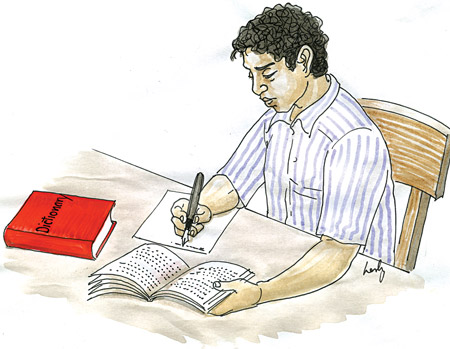Heroes without statues
 There
was a time when I wasn’t quite fond of translations. There
was a time when I wasn’t quite fond of translations.
That was till I realize the worth of translations. Well, this is not
only about Sinhala or English translations into each other, but
translation literature as a whole.
I was telling my mother one day how useless translations are. But
then she left me with no response: “Even Chekhov is translation, you
know that?” Yes, I was reading Chekhov at the time, but it didn’t click
me till she exposed. I was reading David Magarshack’s translation though
actually it is Constance Garnett who earned the English fame for Chekhov
among the likes of James Joyce, Virginia Woolf and Katherine Mansfield.
He translated Tolstoy and Dostoevsky too.
Not only the Russians, but also Greek and Roman classics, Bengali
works and so on will be in dark if not for translators.

And now, this is something interesting. Paulo Coelho is becoming
popular in these lands with his books dominating the shelves. There is a
Sinhala translation or two. Well, there are people who talk about Coelho
in length too. They all comment on the language factor too, in addition
to the philosophical content.
I wonder if most of them know all these works by Coelho are but
translations. Margaret Jull Costa handles a great deal of it. She
translates Portuguese and Spanish works into English.
I see a difference between Costa and our translators. When Costa or
any other translates their names are credited in small print inside,
whereas our translators enjoy being credited on the cover itself. Well,
that’s no issue in the least. At least our ones are thanked that way. We
had good old wholesome days especially when it comes to oriental
culture. Ven. Buddhagosha translated the whole Pali canon into Sinhala
and vice versa. Then there are many others both much and lesser known.
Thanks to these translators we could read many world classics in Sinhala.
We have been blessed with some good translators of English: A. P.
Gunaratne, K. G. Karunathilaka, Cyril C. Perera to name a few. But for
some reason, I don’t think we have an enhanced translation literature.
Our present translation literature is just an industry mushrooming with
so many products.
Except for a few good ones, I don’t see many good translators. You
can find a good deal of translations, which, as publishers say, sell
like hotcakes. And of course we have conflicts with their use of
language.
It’s not whether they use the right or standard language, but if they
deliver the right meaning. One thing is that they are strictly
translations. And many of the translators seem to have missed the tone
of the original work, which is something really important. Funnily
enough some even translate the idioms. Just imagine ‘it cost me a
fortune’ or ‘pay through the nose’ being translated strictly according
to word. Believe me, this really happens, though I would not mention
where. It’s not something you can do with a dictionary aside alone.
Now why do we need translators? Not that the likes of Coelho are not
conversant in English, but they prefer writing in mother-tongue. That’s
the case even in our country. Luckily for Coelho, he has translators to
bring his works to the world hot off the shelf. But in our case, except
for those who translate English into Sinhala, who is there to do
otherwise? Barely any, and, even then, most of them are sort of
hopeless.
True, there is a dilemma about translations. Whether the translator
will do justice to the original remains a question, and in most cases we
cannot examine it. For that we have to be familiar with the original.
But even then we should be more grateful to those who translated the
non-English works. English works will anyway be accessible to the world
audience, while the vernacular works would only be accessible to the
respective country.
If not for translators, we would never get a chance to read most of
the Greek, Roman, Russian and other literatures.
Everybody likes Shakespeare. Or at least play act they like him. I
like to read him too. But recently when I read the verse translation of
Sophocles’ Theban plays, I found the language mellower than Shakespeare.
May be the Bard is too archaic, while Sophocles’ translator manipulates
the language in a modern way. One thing is Sophocles’ talent, and for
the language the translator should also be praised.
So ultimately translators are just like heroes without statues.
Nobody ever takes notice of them, hence no songs in praise of them. We
shall thank translators more profusely, I think.
My problem however is none of these. Translation puts the knife in
your creativity, forcing you to struggle with someone else’s tone. True,
we could not have read all those vernacular classics if not for
translators, I repeat.
But then again isn’t translation a sad waste of energy, if anything?
[email protected] |



